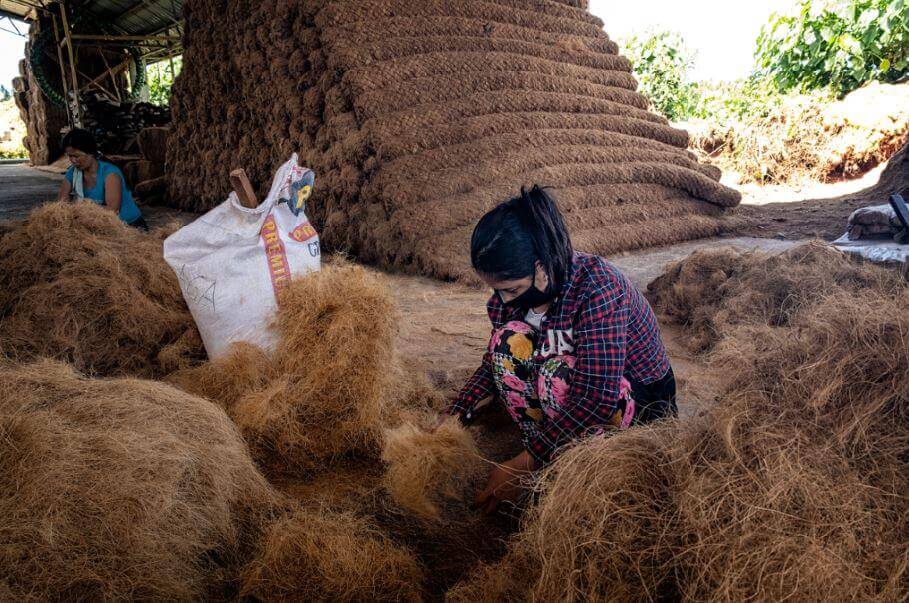
HABI has introduced an abaca weaving contest that seeks to revive livelihood among weavers across the Philippines.
The Eloisa Hizon Gomez Abaca Competition encourages abaca weavers of any age to showcase their creations and get the chance to win the PHP50,000 cash prize.
The competition is inspired by its namesake—a prominent Kapampangan who actively encouraged the use of Filipino textiles, and is mother to popular haute couture ‘70s fashion designer Gang Gomez, now known as Dom Martin Gomez, OSB.
As the main man behind this competition, which is a fitting tribute to his mother’s advocacy, Gomez says the main goal of the event is to revive and encourage the weaving of abaca cloth, as practiced in Mindanao among the T’boli and other indigenous groups, the Visayas, and the Bicol region where the plant grows well.
Even as a contemplative monk, Gomez still continues to work with local weavers to develop and innovate traditional textiles, while also designing church vestments. He approached HABI with the idea of holding a competition for abaca artisans, which is supported by his vision of upscaled and refined craftsmanship for the industry.
“Abaca is important because it is the genuine Filipino weaving fiber,” says Gomez. “Filipinos were already wearing clothes made from abaca weaves when the Spanish colonizers arrived. If we had only given abaca as much attention in its development as we have given to piña, can you imagine how much progress could have been attained by now? Hopefully, this annual competition will give the abaca weaving industry that much-needed push!”
“There is nothing like competition to stimulate our artisans’ creativity to strengthen and grow that industry,“ adds Adelaida Lim, HABI president.
VERSATILE ABACA
Aside from reviving and promoting the use of abaca, the competition also serves to remind people of the versatility of this fiber, which is also globally known as Manila hemp.
Abaca has been used by Filipino scientists to develop non-woven fabric to filter water pollutants, line astronaut space suits, and manufacture an amphibious vehicle for disaster rescue and relief operations
When the COVID-19 pandemic broke out, Abaca fiber was used to create face masks and other Personal Protective Equipment.
“Abaca is the Philippines’ major export product. We are known the world over for it. In the maritime industry, ropes made of abaca are widely used. The Japanese yen incorporates abaca fibers in their paper currency,” Lim says. “We have even acquired new uses for it, such as in the manufacturing of automobiles.”
HOW TO JOIN
Here’s how to join the Eloisa Hizon Gomez Abaca Competition:
- Participants must submit a panel measuring at least six meters long, there are no restrictions on the width
- Entries must be made of 100 percent abaca and based on a traditional pattern and/or weaving technique
- Each entry must also have a title, a detailed description, and a photograph showing the weaver working on his/her entry
- Entries must be packed with care and submitted to the HABI Office at 962 May Street, Mandaluyong City, Metro Manila
- Deadline for submission is on September 30, 2022
Three winners will be announced at the Likhang HABI Market Fair slated for October 14 – 16, 2022. They will each receive a prize of PHP50,000.00. The entries will be exhibited as part of the fair and sold, should the contestants agree. These pieces will be displayed alongside entries from the Lourdes Montinola Piña Weaving Competition, making them officially part of a HABI Market Fair annual tradition.
As with its piña weaving competition, HABI hopes to inspire mainstream fashion retailers, through this abaca weaving contest, to patronize abaca just as they do the piña cloth, in order to keep alive local textile creations and the use of natural fibers.
“The use of our textiles, whether commercial, through fashion retailers, or personal, is the only way our textile industry will survive and grow,” says Len Cabili, founder and creative director of Filip + Inna, and also a strong advocate of local textiles. “We are excited to see the excellent craftsmanship of weavers around the Philippines.”
In addition to inspiring more weavers to pass on a heritage tradition to the next generation, the competition would also contribute to the sustainability of the fashion industry, as abaca could cut the need to import polyester yarns created by the demand for fast fashion, which directly increases environmental pollution.
SHARE THIS STORY with weavers and others who may want to join the Abaca weaving contest that seeks to revive Filipino weavers’ livelihood!
Good News Pilipinas is a Lasallian Scholarum Awardee. TELL US your good news story tips by messaging GoodNewsPilipinas.com on Facebook, Twitter, Instagram, or e-mail editor@goodnewspilipinas.com and WATCH Good News Pilipinas TV YouTube & Good News Pilipinas TikTok for more Filipino Pride stories!










